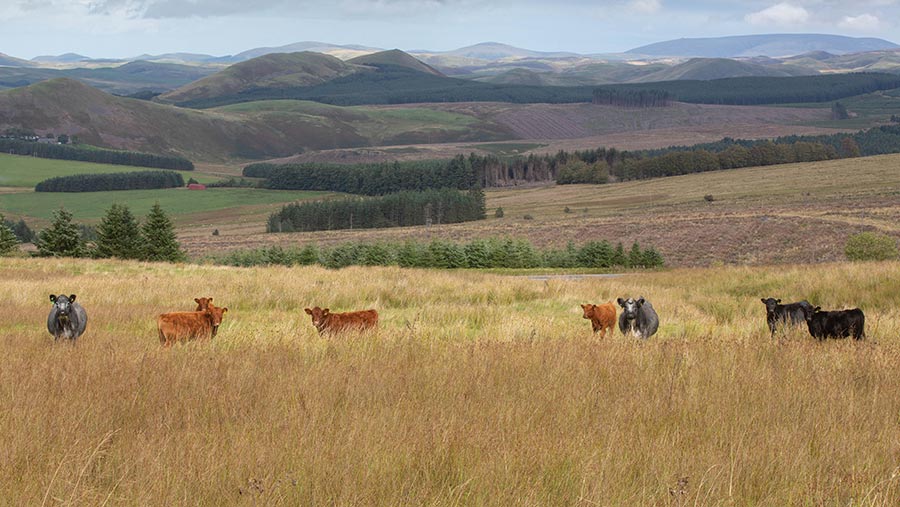Hill farmers unimpressed with Defra’s new ELM offer for uplands
 © Tim Scrivener
© Tim Scrivener Defra is being accused of failing hill farmers again with its latest offer under the Sustainable Farming Incentive, owing to a lack of a credible transition to nature-friendly farming.
The Agricultural Transition Plan lasts from 2021 to 2028, and now half way through, the NFU and others are concerned that there is still no viable plan on the table for the hills and uplands.
Defra secretary Steve Barclay outlined his plans for the Sustainable Farming Incentive (SFI) 2024 at the Oxford Farming Conference on 4 January, but there was insufficient detail to allow hill farmers to plan the future of their farming businesses.
See also: Upland farms face 37% funding hole under ELM, warns NFU
Additionally, more than 54% of moorland in England is already in legacy stewardship schemes, such as Higher Level Stewardship, and no increase in payment rates is being offered to these farmers.
This is despite Defra claiming an average 10% payment uplift to Countryside Stewardship (CS) and SFI agreement holders.
For the remaining 46% of moorland, there are no new moorland land management options currently available for farmers to apply for.
Combined scheme offer
As things stand, CS Mid Tier and Higher Tier schemes are both closed for applications, but Defra says it plans to open its new combined SFI and CS Mid Tier offer in the summer, with agreements not expected to begin until the autumn.
Applications for the CS Higher Level scheme will need to be made separately, with more details to be released nearer the time. Only very limited options are available under the SFI for common-land farmers.
Julia Aglionby, an expert in hill farming from the University of Cumbria, said: “Yet again those who deliver most for nature, landscape and beauty have been let down.
“They are not benefiting from the 10% average increase in payment rates and those not in a scheme face yet another year of dither and delay.
“Farmers in England are already deeply concerned that the government has broken its manifesto promise to maintain spending at the 2019 level of £2.4bn for every year of this parliament. In the last year, Defra underspent its agricultural budget by at least £200m.”
With this delay in rolling out new schemes and further reductions in Basic Payment Scheme (BPS) funding scheduled for later this year, Prof Aglionby expects the underspend for farmers, especially those in the uplands, will only increase (see “Defra ‘still committed’ to spending all of farming budget”).
“How can the government expect to get money out the door to farmers if they haven’t even got their new schemes open for business?” she asked.
‘Lack of tangible payment rises’
Exmoor hill farmer Robin Milton said the average 10% increase in payments for SFI and CS actions is “very unevenly distributed, with a lack of tangible increases over significant areas of upland and grassland farms”.
For instance, Mr Milton noted that although Defra had increased the GS6 species rich grassland option to £646/ha/year, it is only available in CS, with 26,300ha countrywide in this option.
“You can’t enter anything into GS6 that is not a mapped priority habitat,” he explained.
Meanwhile, the more popular permanent grassland options such as GS2 and GS5, which cover 358,600ha, had seen no increase at £151/ha/year, Mr Milton said.
NFU Uplands forum chairman Thomas Binns said: “Upland farmers are very much going to have to search through all the options for some solace because it’s not obvious where they are going to make up some of their lost BPS income.”
A Defra spokesperson said: “We have worked with upland farmers to increase payment rates, including in many cases those in existing agreements.
“We have developed a new range of actions on moorland that farmers can be paid for, offering greater flexibility and supporting the sector to produce food sustainably while protecting nature and enhancing the environment.
“We continue to do all we can to support British upland farmers – and will work with them to take on board feedback so that our schemes work in the best possible way and they can run profitable, sustainable businesses.”
Defra ‘still committed’ to spending all of farming budget
Defra says it remains committed to spending an average of £2.4bn on the agricultural budget for England every year for the life of this parliament.
The department’s own figures show that in the 2021-22 financial year, it spent £150m less on payments to farmers and a further £220m less in 2022-23.
The government faced criticism this week that it has reneged on its pledge to protect the annual £2.4bn budget for English farmers.
But Defra farming minister Mark Spencer told Farmers Weekly that his department still remains committed to spending the whole of the agricultural budget and that it would inject a further £100m over the annual £2.4bn budget for England this financial year through various grants and schemes.
A Defra spokesperson insisted it remains “on track” to meet its farming budget commitment with a higher spend in the final year of parliament.
But with a general election scheduled for this year, farming groups have limited confidence Defra can get the money out of the door given some schemes are not ready to roll. Farmers fear the underspent cash will be swallowed up by the Treasury.
